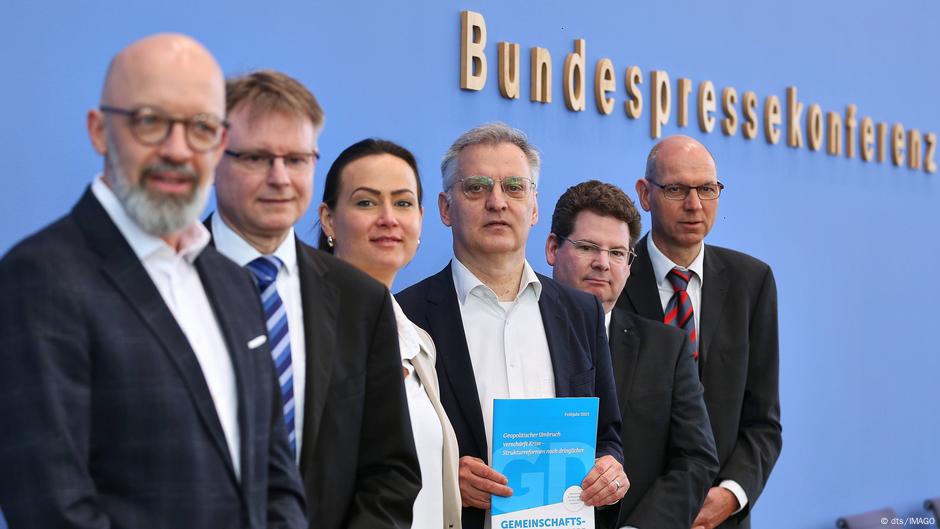“It’s the economy, stupid.” Decades ago, this phrase featured prominently in a US presidential election campaign and it still remains relevant to this day. When a country’s economy is doing well, this translates into jobs, and that means income and taxes that allow the government to fund its activities.
In the past three years, the has not been doing well at all. Entire production sectors in energy-intensive industries have been shut down, and there has been virtually no economic growth. For the current year, leading economic research institutes predict an increase in gross domestic product (GDP) of just 0.1%.
Now, due to the a new uncertainty is expected to
Loans and investment
This is not a favorable scenario for a new government. The conservative bloc of and (CDU/CSU) and the center-left (SPD) have just reached a deal on forming a coalition government, likely to take office in early May. One of the central plans is to get the economy moving again.
One thing that will help is that the government now has more room to maneuver when it comes to public debt. And there are virtually no limits on defense spending. An additional will be available for additional investments into climate protection and infrastructure over the next twelve years. Economists warn that the money should be spent wisely. The defense and construction industries, for example, are already swamped with orders. Adding more would raise prices and fuel inflation.
Interest has to be paid on loans. By 2037, Germany’s mountain of debt could grow to the point where all the loans the government is allowed to take out effectively just go straight into paying interest.
Demographics
The biggest burden is Germany’s aging society. The fewer young people there are, the fewer workers and skilled workers are available. This could potentially reduce Germany’s economic power because fewer people produce less.
As the number of elderly people increases, more pensions have to be paid and health and care costs rise. This has to be financed by the working population and by companies. In Germany, employees and employers pay in to social security funds. Economists demand the social security system be adapted to the demographic change.
However, the SPD in particular wants to keep pension levels stable and generally does not support cuts in state social spending. As there was no agreement between the CDU/CSU and SPD on this point, working groups are now to meet and come up with viable proposals.
Subsidies and energy
The new government wants to lower energy prices for energy-intensive companies. There are plans for the construction of high capacity gas-fired power plants by 2030. The new government is not planning a return to nuclear power or coal.
The CDU/CSU and SPD want to help the automotive industry by creating tax incentives for automobile purchases, including a special tax write-off and exemption from the vehicle tax for electric cars.
Bureaucracy
Germany is choking on red tape. Lengthy planning procedures drag out construction projects, and companies have enormous documentation and verification obligations.
The Ifo Institute for Economic Research in Munich estimates that bureaucracy costs the economy around €150 billion per year. In the coalition agreement, the CDU, CSU and SPD have pledged to reduce these costs by a quarter by thinning out the thicket of regulations and laws.
Economic researchers welcome this: “You can quickly work out how much less paper will be filed away in folders and how much money will flow into the production of goods and services,” says Timo Wollmershäuser from the ifo Institute.
Digitalization and the use of artificial intelligence could also help. These terms appear several times in the coalition agreement. “Assuming that we actually implement these things quickly, then it has the potential to increase our growth potential and the rate of technological progress over the next few years,” Wollmershäuser believes.
To achieve this, however, more money must be invested in research and development, but above all in education, says Torsten Schmidt from the RWI Leibniz Institute for Economic Research. “We need to generate new knowledge and be able to implement it in production, more patents need to be registered,” Schmidt said. The coalition agreement is not very ambitious in this area, apart from plans to promote start-ups.
Overall, economic researchers see “a series of good ideas” in the coalition agreement, but are skeptical as to whether the plans will be sufficient in view of the problems facing the German economy as a whole. “Simply following through on the coalition agreement will hardly be enough,” warns Stefan Kooths from the Kiel Institute for the World Economy.
This article was originally written in German.
While you’re here: Every Tuesday, DW editors round up what is happening in German politics and society. You can sign up here for the weekly email newsletter Berlin Briefing.
The post Will the new German government fix the economy? appeared first on Deutsche Welle.




